Corporate Plan: 2020/21 to 2023/24
You are in an archived section of the AIFS website
August 2020
Downloads
Message from the Director
I am pleased to present the corporate plan for the Australian Institute of Family Studies (AIFS), which will guide our work over the next four years.
We are the Australian Government's key independent research body and advisor in the area of family wellbeing. Our guiding purpose is to create and communicate knowledge to accelerate positive outcomes for families - because when families thrive, Australia thrives.
Families have faced multiple challenges in 2020, with the bushfires and COVID-19 pandemic placing major strains on family life, relationships and livelihoods. Families have had to adapt to these external disruptions in order to supervise children doing remote learning while working from home, care for vulnerable family members during lockdown, support family members who have lost income, and cope with significant financial pressures and uncertainty.
Individuals look to their families for support every day and even more so during times of crisis. In these tumultuous times, families need a voice to convey their experiences and needs to the policy makers, practitioners and advocates who make decisions that affect families' lives. More than ever, evidence based on 'what works for families' is necessary to ensure decisions are made that support families to do their job well.
This has given AIFS the impetus to ask how we could be even more of a trusted voice for families. The pandemic has amplified our strengths and weaknesses, and the challenges we face in our operating environment. A major priority for us this year will be renewing our strategy for the post-COVID world.
In this pandemic year AIFS has demonstrated resilience, flexibility and innovation. Despite the challenges of being located in Melbourne and working from home for long periods during the successive lockdowns, the staff at AIFS have been incredibly productive. They have shown great agility in adapting projects to respond to COVID-19, assessing new opportunities and committing to uninterrupted delivery on a substantial program of work for 2020/21. The seven major priorities this year are:
- Delivering the AIFS Conference in June 2021 (rescheduled from June 2020 because of the pandemic): to connect sectors, researchers, policy makers and practitioners with the latest knowledge and insights about families
- Implementing multiple waves of the new Families in Australia Survey: for insights and analysis about how families are coping with and adjusting to the COVID-19 pandemic
- Implementing the innovative Knowledge Translation and Impact Lab: to build the capability of the child and family sector and researchers to bridge the gap between knowledge and practice
- Finalising our Strategic Plan 2021-2026: to define our direction in a post COVID-19 world
- Redeveloping our website: to make evidence easier to find, and easier to apply in practice
- Improving our online working environment: by rolling out Windows 10 and Microsoft 365, and transitioning our manual, paper-based processes to an online workflow system
- Implementing the Doing My Best Work Performance Development Program for our staff.
To enable us to achieve our priorities, we'll continue to draw on our capabilities to experiment creatively, test new ideas and adapt to face our changing environment. A key change this year will be welcoming a new Director of AIFS, as I am leaving to take up the role of National Children's Commissioner in November 2020. I have been honoured to be a part of the AIFS journey. I have confidence that the new Director has strong foundations to take AIFS to its next phase to become a strong voice for families. They will be blessed with productive collaborations with our partners and stakeholders, and an incredibly talented and committed team at AIFS to deliver on the priorities in our plan.
Anne Hollonds
Director, Australian Institute of Family Studies
About AIFS
Our purpose: We create and communicate knowledge to accelerate positive outcomes for families and communities.
Our values
Our shared values underpin our work, our interactions with each other and our interactions with our partners and stakeholders. They help guide our decision making, hold us collectively accountable to behavioural standards and connect us to a higher purpose.
These values, developed by our staff, have been instrumental in transforming our culture and guiding organisational change initiatives, including engaging staff in the design and fit-out of our new premises.
AIFS' values are:
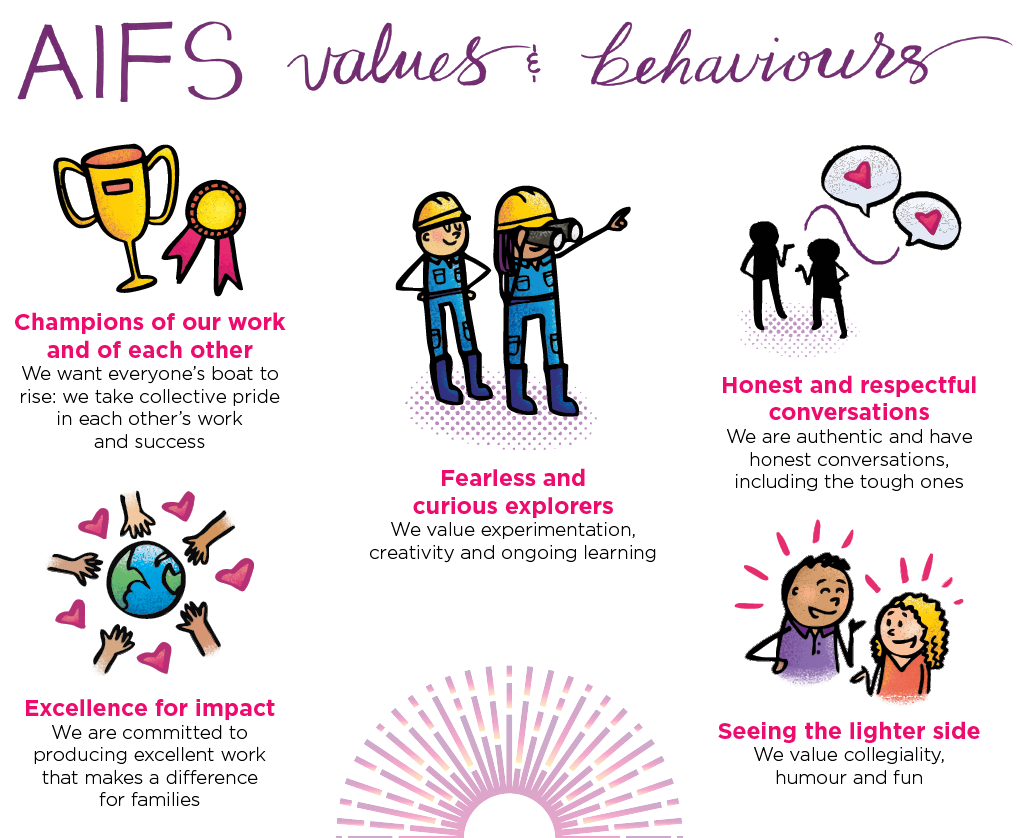
As public servants, we're also committed to upholding the Australian Public Service (APS) values. At all times, we strive to be:
- impartial
- committed to service
- accountable
- respectful
- ethical.
Our role
The Australian Institute of Family Studies (AIFS) is the Australian Government's key family research body and advisor on family wellbeing. Our purpose is to create and communicate knowledge to accelerate positive outcomes for families. Because when families thrive, Australia thrives.
Our research increases understanding of the factors that help or hinder the wellbeing of Australia's families. We build evidence about 'what works for families', which can be translated into action on the ground. We play a critical role in closing the gaps between research, policy and practice. Everything we do is designed for impact on policy and practice.
We are a statutory authority of the Australian Government, established under the Family Law Act 1975. We commenced operation in February 1980 and are based in Melbourne.
What we do
We undertake and publish primary research on a broad range of issues affecting Australian families. Our research involves a range of data collection and analytic methods, including quantitative, qualitative and mixed methods.
We also manage a number of major, large-scale longitudinal studies that track participants' lives through time at different ages and stages. These studies contribute to a robust evidence base to equip policy makers, researchers and stakeholders with data that help them make progress on some of Australia's most pressing issues.
We also impact policy and practice by:
- providing advice on the design and implementation of policies and services
- evaluating policies and programs (to discover what works for families)
- building the capability of policy and service-delivery agencies to design and deliver evidence-informed services for children, families and communities.
Visit our website to explore our work, publications and events, and to discover our research agenda in more detail.
What makes us different
With 40 years' experience conducting high quality, responsive and impartial research, AIFS has impeccable credentials to understand the diverse issues affecting Australian families.
We have an established reputation as a trusted and credible source of evidence and advice. We add value to commissioned research by communicating findings via synthesis pieces, fact sheets, infographics and animations describing core headline data.
We understand the challenges that policy makers and practitioners face, and we bring a real-world lens to our research. Our work is built on strong foundations of academic excellence; however, we are not confined to traditional academic outputs. Our work is designed to meet the needs of end users, and ultimately to benefit families.
Our relationships
The Institute operates within the portfolio of the Department of Social Services (DSS) and is responsible to the Minister for Social Services. We conduct research across numerous Australian government departments, states and territories. The research creates evidence that leads to sound decisions and better outcomes for Australians of all ages and in many family contexts.
Our stakeholders include:
- the Australian Government and state, territory and local governments
- families and community members
- people who provide services to families and children
- researchers
- policy makers
- partners in other countries.
We receive expert advice and oversight from:
- the Risk Assessment and Audit Committee
- Ethics Committee
- Independent Research Advisory Panel
- The Australian Gambling Research Centre Expert Advisory Group
- Specific research project advisory groups:
- Scientific Advisory Group (Ten to Men: The Longitudinal Study of Australian Male Health)
- Community Reference Group (Ten to Men: The Longitudinal Study of Australian Male Health)
- Consortium Advisory Group (Growing up in Australia: The Longitudinal Study of Australian Children).
AIFS acts as a bridge between the worlds of research, policy and practice, and this is reflected in the breadth of our relationships. We work in partnership with our stakeholders to provide evidence, translate knowledge and build capability to address complex social problems and contribute to the design of human-centred policy and services.
Figure 1: AIFS' relationships
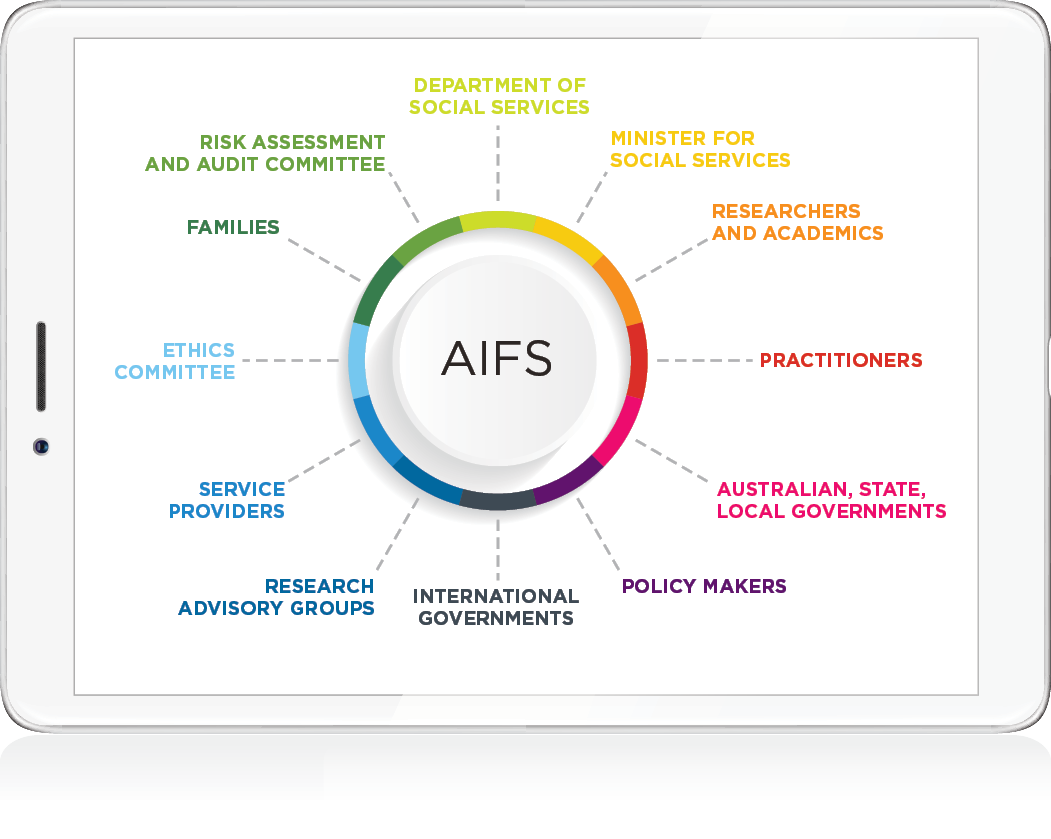
Our work
Table 1 shows how our work is oriented to the strategic pillars that contribute to achieving our purpose. Details of our work are outlined below the table.
Table 1: AIFS' strategic pillars and what we do
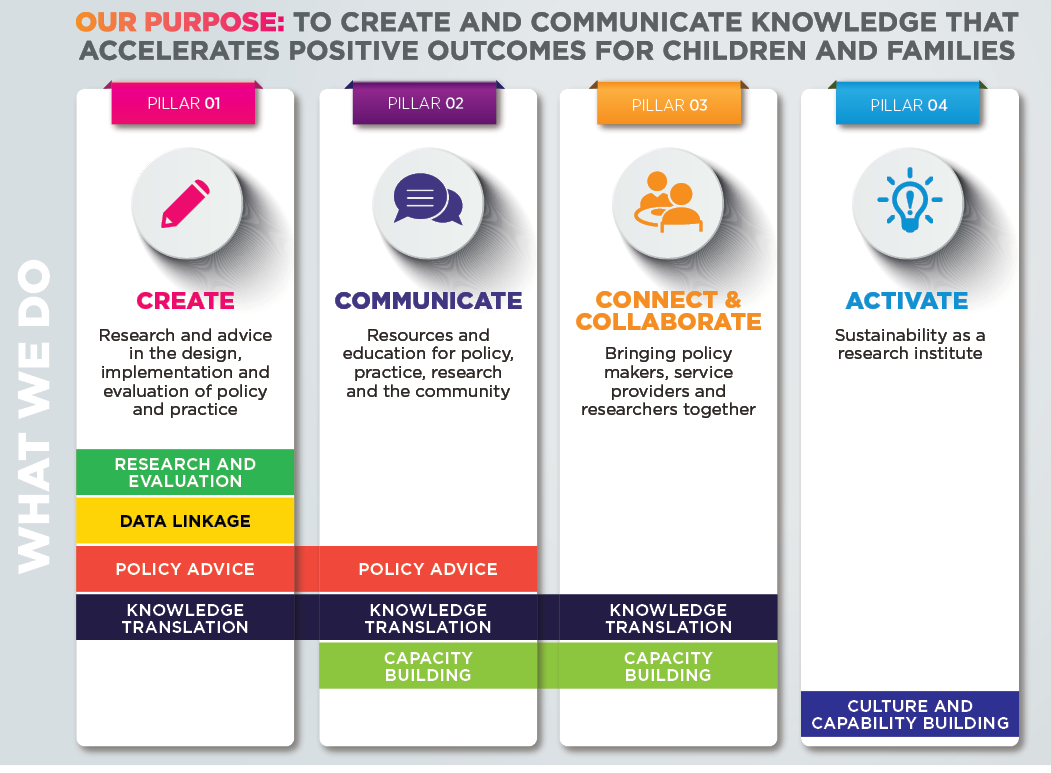
Research and evaluation
We undertake and publish primary research on a broad range of issues affecting Australian families. Our research involves a range of data collection and analytic methods, including quantitative, qualitative and mixed methods. This helps to:
- make progress on some of Australia's most challenging issues
- discover new insights that lead to service and policy improvements
- lead to better decisions about the funding of services
- contribute to a robust evidence base.
Data linkage
We undertake data linkage and integration projects that bring together datasets from multiple sources for statistical or research purposes. Linkage of datasets yields valuable new information for research and policy making, in a secure, privacy-preserving manner.
Policy advice
We provide independent advice about a range of issues relating to the wellbeing of families. We contribute our policy advice through both formal and informal channels (including working groups and reference groups) to assist governments to make sound decisions affecting families. At all times our advice is impartial and based on the best available research evidence.
Capacity building
We build the capacity of researchers, policy makers and practitioners who provide services to families, children and communities by:
- providing a wide range of resources and publications
- offering webinars and conferences to connect them with the latest evidence and insights about families and the implications for policy and practice
- providing tailored program planning support, training and advice
- facilitating partnerships between other evaluation experts and service providers.
Knowledge translation
Knowledge translation is the process by which relationships, collaborations and communication channels are used to ensure that researchers are:
- asking and answering the right questions
- presenting the evidence in a way that is easy to understand and relevant to the end user.
Our goal is to increase the use of evidence in policy and service delivery to reflect what works for families.
Culture and capability building
This is a program of activities within AIFS that promotes a culture of excellence, innovation, and staff wellbeing and engagement. It also includes continuously improving our operations and ensuring our sustainability as an independent research institute.
Pathway to impact: how our work makes a difference
AIFS helps improve the lives of families by:
- conducting research to understand the issues
- synthesising findings in formats that are accessible, practical and relevant
- informing and connecting stakeholders in government, service provision and practice, and creating dialogue between government and the service sector
- communicating insights in multiple ways, from one-on-one discussions (help desks, briefings and advice) through to events (conferences and webinars) and broadcast media (websites, publications, social media and traditional media).
Governments use our insights to enact systemic change via policy and resource allocation. And service providers use our insights to develop their people, deliver direct action, and enhance their programs and practices for better family outcomes.
- The outcome is more effective legislation, programs and practices.
- The impact is better outcomes for Australian families.
Our research
In 2020/21, our research activities span a number of cross-cutting themes underpinned by our What Works for Families Framework (see below). Key themes include:
- Life stages and transitions
- Family relationships
- Social and economic participation (including social cohesion and work and family life)
- Challenges for families (including family violence, child abuse and neglect, and the impacts of addiction on families).
Families Framework
Our What Works for Families Research Framework (Families Framework) articulates our understanding of families, their role, and the supports they need from government and civil society to flourish.
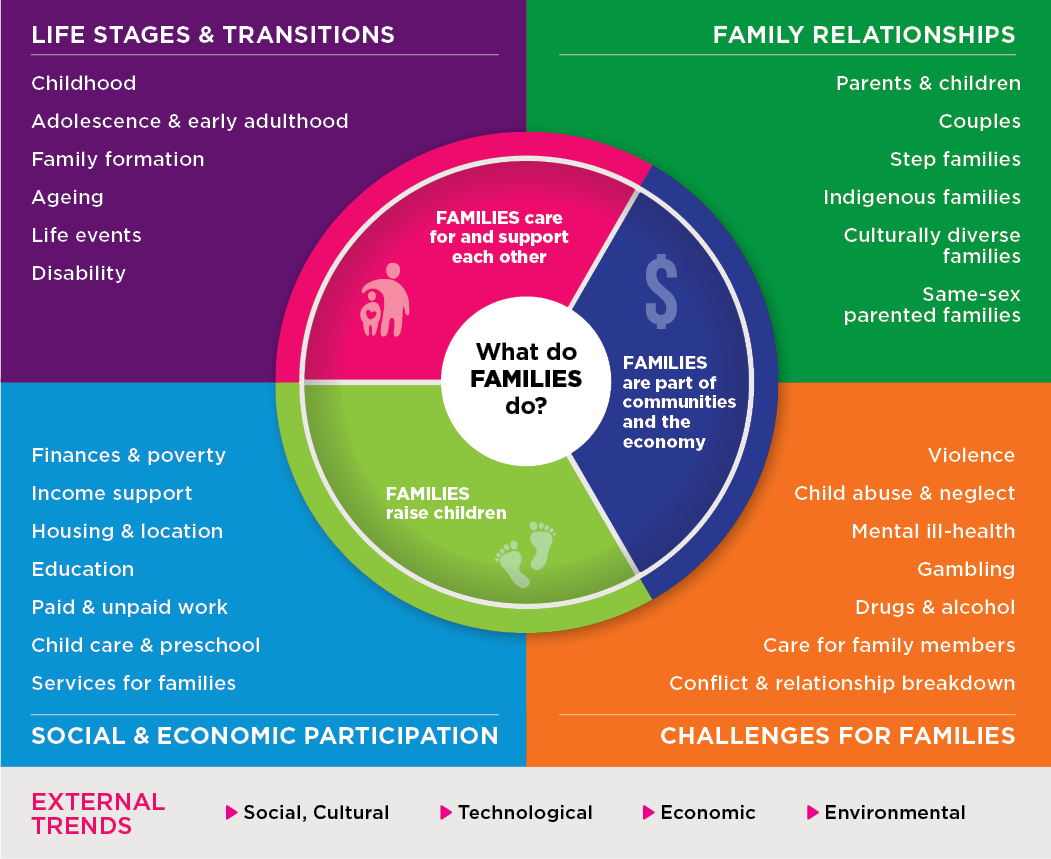
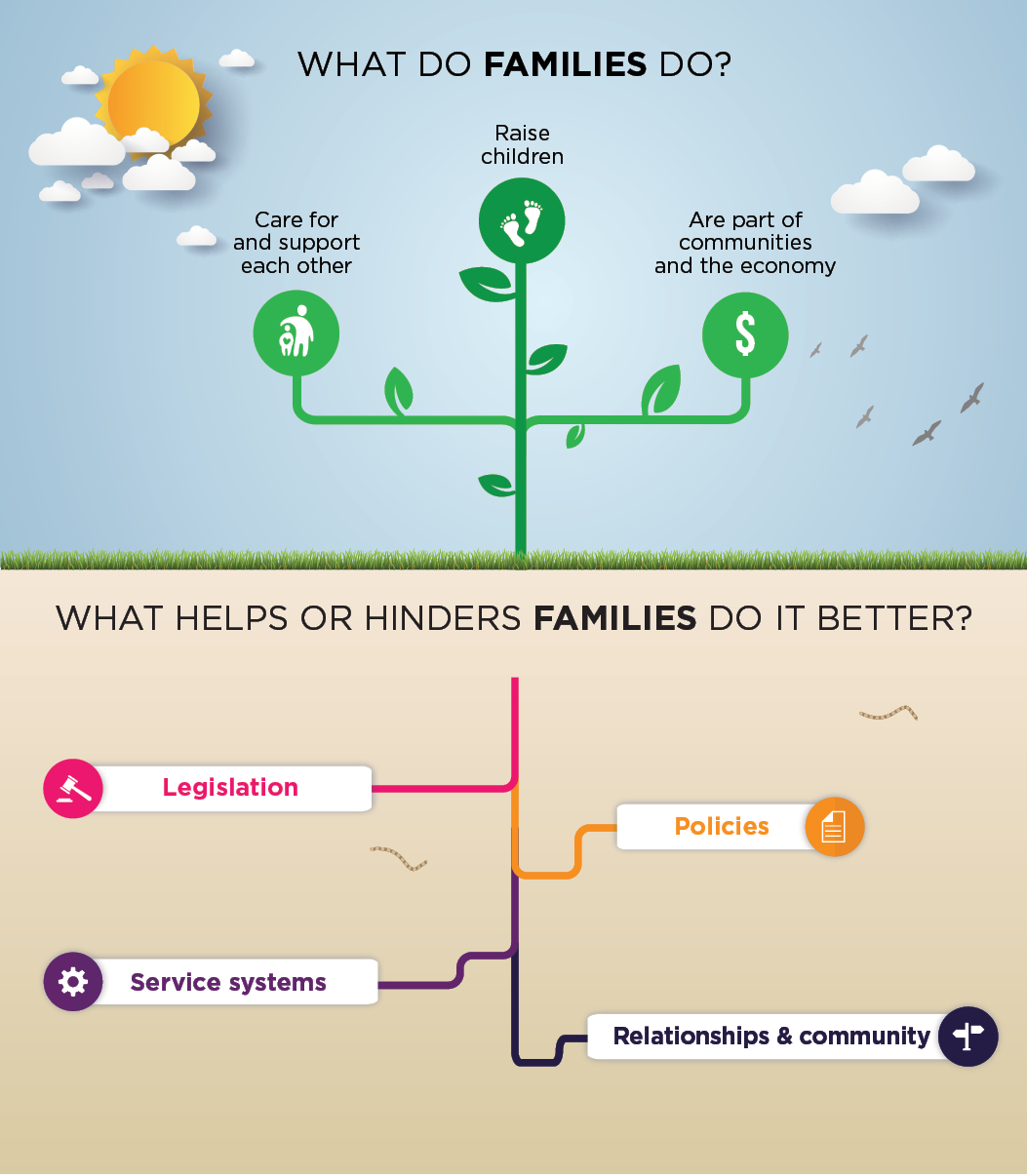
Research program areas
Our researchers work across six program areas:
- Families and Society
- Family Trends: Relationships and Wellbeing
- Longitudinal and Lifecourse Studies (LLS)
- Family Law and Family Violence
- Family Policy and Practice
- The Knowledge Translation (KT) Lab.
Alongside these program areas, the Institute houses the Australian Gambling Research Centre (AGRC). All programs use a variety of methods and lenses to explore cross-cutting themes.
Families and Society
This program area focuses on the major factors that shape and influence family life and wellbeing.
Major activities in 2020/21 in this program area include:
Families in Australia Survey
The Families in Australia Survey is AIFS' own comprehensive survey that explores the current contexts of family life in Australia. Its scope is every person in every type of family. The current focus of the survey is to understand the impact of the COVID-19 pandemic on the lives of Australian families.
We intend to run a number of waves of the survey in 2020/21 to paint a picture of how people are coping with and adjusting to the coronavirus pandemic, one of the greatest health, social and economic challenges in the last century. It will also document how families fare after the pandemic emergency and when we move into the recovery phase.
We will share the insights drawn from the Families in Australia Survey with the general public and with non-government and government agencies to help them develop the supports that families need.
Work and family interactions
Finding the right balance between work and family is an issue that affects all Australian families. Increasingly, in Australia, both parents work outside the home either in full-time or part-time employment. This affects many family issues such as child care, parenting responsibilities, housework and employment flexibility. In 2020/21 we will finalise work on the evaluation of the Australian Government's Child Care Package.
Families and the economy
In 2020/21 we will be developing a research program focused on how the economy interacts with families to influence the choices they make and shape their life trajectories.
Family Trends: Relationships and Wellbeing
The Family Trends: Relationships and Wellbeing program area analyses and disseminates information on broad trends in the patterns of family members leaving home, couple and family formation, family stability, and family dissolution and re-formation, along with associated values, attitudes and beliefs. As well as providing a better understanding of society's core values, the monitoring and analysis of these trends are important for policy development and adjustment, and for the timely development and design of research projects.
Family Law and Family Violence
The Family Law and Family Violence program undertakes research in the areas of family law, family violence and elder abuse. The aim of this research program is to produce a rigorous evidence base that will inform the development of policy, programs and practice in these areas.
Family law has been a core focus for AIFS since its inception as part of the Family Law Act 1975. With family law reform on the government's agenda, we will leverage our extensive evidence base to contribute to thinking and understanding about the circumstances and needs of separated families, including a focus on children. In the past decade, the family law research program has produced a series of reports that have had a significant influence on family law policy, including highlighting the nature, prevalence and impact of family violence among separated families.
Major activities in this program area in 2020/21 include:
Elder Abuse Prevalence Study
The National Elder Abuse Prevalence Study is the first large-scale effort to assess the nature of elder abuse and the extent to which it occurs among those in the Australian population aged 65 and over.
Evaluation of the Small Claims Property Pilot
We are evaluating the Small Claims Property Pilot, a new court-based model for small value property matters (up to $500,000 excluding debt and superannuation) to be trialled in four Federal Circuit Court Registries (FCCoA). The pilot aims to increase access to mechanisms to resolve post-separation property matters for parties (particularly women) for whom the value of the property pool may make it uneconomic to pursue an outcome through family law system services (mediation or a court process) due to a gap in the availability of efficient, low-cost avenues for property settlement.
Evaluation of the Lawyer-assisted Property Mediation: Legal Aid Commission Trial
We are evaluating a trial program for legal aid commissions to provide legally assisted mediation for small value property matters (up to $500,000 excluding debt and superannuation). The pilot aims to increase access to mechanisms to resolve post-separation property matters for parties (particularly women) for whom the value of the property pool may make it uneconomic to pursue an outcome through family law system services (mediation or a court process) due to a gap in the availability of efficient, low-cost avenues for property settlement.
Family Policy and Practice
The Family Policy and Practice program area researches and evaluates policies and services for families and children, as well as providing capability-building supports to the child and family service sector to develop their own evidence base. The research, evaluation and capability-building activities undertaken by our multi-disciplinary team aim to:
- increase understanding of the effects of government policies and services on families
- increase the use of evidence-informed practice by governments and service providers
- help governments and service providers use appropriate evidence that will improve family wellbeing.
Family Policy and Practice uses a mix of qualitative and quantitative methods to undertake research and evaluation in the areas of family support, family violence, early childhood education, child protection, and service supports for current and ex-serving defence force members.
Major activities in this program area in 2020/21 include:
Families and Children Expert Panel
This project builds the capacity of service providers funded under the Department of Social Services' Families and Children Activity (FAC) to deliver evidence-informed programs and practices and to build the evidence base through evaluation. It provides tiered support to FAC service providers, with support ranging from published papers, practice guides and videos on how to undertake evaluation through to tailored one-on-one support for individual service providers who are seeking advice about how to plan and evaluate their programs.
Early Intervention Evidence and Evaluation Fund
We are collaborating with the Social Policy Research Centre (SPRC) at the University of New South Wales to provide evaluation capability-building support to a select number of Targeted Early Intervention (TEI) service providers funded by the NSW Government's Department of Communities and Justice (DCJ). AIFS' role in this project is to help assess service provider needs for evaluation and to help providers to build their own evaluation, monitoring and data collection capability.
Child and Family Centre (Northern Territory) Evaluation
The Northern Territory Department of Education and the Reform Management Office have commissioned AIFS to review and evaluate the six existing Child and Family Centres (CFCs) in the Northern Territory (NT) and examine the establishment of three additional CFCs in new locations in the NT.
Longitudinal and Lifecourse Studies (LLS)
Following a large group of people over a long period of time is a powerful way to learn about people at different ages and stages. It provides a level of research and statistical insight not available from one-off or repeated cross-sectional studies.
The Longitudinal and Lifecourse Studies Program supports policy makers, researchers and the general public by:
- identifying patterns and pathways of development
- exploring how problems arise for some people but are avoided or resolved by others
- investigating some of Australia's most challenging issues
- discovering new insights, leading to service and policy improvements.
The Longitudinal and Lifecourse Studies program specialises in the design, implementation and management of large-scale longitudinal research projects. These projects generate important insights to help understand family life, developmental trajectories, relationships and wellbeing.
Major activities in this program area in 2020/21 include:
Growing up in Australia: The Longitudinal Study of Australian Children (LSAC)
Growing Up in Australia: The Longitudinal Study of Australian Children (LSAC) is a major study following the development of around 10,000 children and their families from urban and rural areas in all states and territories of Australia. A key aim of the study is to identify policy opportunities for improving supports for children and families, and for early intervention and prevention strategies. The study also provides valuable insight into the paths Australian children and their families take through life.
Ten to Men: The Longitudinal Study of Australian Male Health
Ten to Men is the first national longitudinal study in Australia to focus exclusively on male health and wellbeing. The study aims to fill the gaps in knowledge about male health and wellbeing across the life course. Its findings will contribute to the development of health programs and policies that are targeted to the special health needs of men and boys.
Building a New Life in Australia: The Longitudinal Study of Humanitarian Migrants
This study examines how humanitarian migrants settle into a new life in Australia. Five annual waves of data collection have been undertaken. The study has followed participants from their early months in Australia to their eligibility for citizenship in order to better understand the factors that influence settlement outcomes, both positively and negatively. Close to 2,400 individuals and families are taking part. Almost all arrived in Australia in 2013, and experienced trauma and persecution before their arrival.
Vietnam Veterans Family Study
The Vietnam Veterans Family Study was a multigenerational study of the physical, mental and social wellbeing of men who served in the Australian military during the Vietnam era (1962-75) and their families. The study, funded by the Department of Veterans' Affairs, examined the physical, mental and social health of partners/spouses of Vietnam veterans, covering a broad range of health outcomes for these people.
Australian Temperament Project
The Australian Temperament Project (ATP) is a multidisciplinary collaboration between AIFS, the University of Melbourne, the Royal Children's Hospital Melbourne and Deakin University. It was established more than 30 years ago to assist in understanding childhood temperament - that is, each individual's way of reacting to their social surroundings - and its effect on behaviours throughout life. This study has shown how temperament affects social, emotional and behavioural development.
The Knowledge Translation and Impact (KTI) Lab
Our work is underpinned by a knowledge translation approach. Knowledge translation bridges the gap between what we know and what we do about it and helps us to achieve impact when we share our learnings.
The role of the Lab is to build the capability of AIFS' research teams to create and communicate knowledge to accelerate positive outcomes for families. The Lab also tests innovative ideas about how to better translate our knowledge. It also delivers funded projects that build the capability and capacity of service providers and policy makers so that they can better meet the needs of families and children.
Major activities in this program area in 2020/21 include:
The National Workforce Centre on Child Mental Health (Emerging Minds)
We are one of four agencies contributing to the delivery of the Emerging Minds program, which aims to equip professionals with resources to identify, assess and better support the mental health needs of children aged 0-12 years. AIFS provides expertise to the program in evidence synthesis, knowledge translation and evaluation.
Child Family Community Australia (CFCA) information exchange
This project is a leading source of evidence-based web resources, publications and professional development for the child, family and community welfare sector. In addition to its publications, CFCA hosts a program of webinars to give our target audiences access to the latest evidence and practice implications on a range of topics. It plays a significant role in providing professional development for the sector.
Capability building for impact
We are implementing an outreach capability-building program that will provide training and support to organisations to increase their ability to integrate research and evidence into their decision-making processes. The aim of this is twofold:
- to lift the relevance and use of research and evidence about what works for families
- to build the skills of practitioners and policy makers to understand how to incorporate research and evidence into their decision making.
The Australian Gambling Research Centre (AGRC)
The Australian Gambling Research Centre (AGRC) was established under the Commonwealth Gambling Measures Act 2012. The AGRC performs policy-relevant research that enhances our understanding of the nature and extent of gambling participation and related harms, and advances knowledge of ways to prevent and reduce harm among at-risk populations, their families and communities.
Major activities in this program area in 2020/21 include:
Gambling in Australia During COVID-19 Study
This study aims to understand how people in Australia adjusted to changes in gambling availability during the COVID-19 pandemic and related restrictions. The study includes a national online survey of over 2,000 people who gamble and interviews with key experts working in the field of gambling, including clinicians, policy makers, regulators, researchers and consumer representatives. We hope to learn more about the types of products people gambled on before and during the COVID-19 restrictions (e.g. sports, racing, pokies, casino games), and how people's gambling participation, alcohol consumption and health and wellbeing changed while restrictions were in place. We will also capture views on policy and practice measures that could be taken to reduce gambling-related harm following the lifting of COVID-19 restrictions. Preliminary findings will be released in the second half of 2020, with further publications expected in 2021.
Pints, Punts 'n' Peers
This project aims to improve understanding of the relationship between alcohol consumption, sports betting and associated harms among young people aged 18-25 years. A national online survey of over 1,000 young men and women was conducted during 2018/19, and publications are expected in the latter half of 2020.
Gambling Activity in Australia (HILDA survey)
This project was funded by the Victorian Responsible Gambling Foundation (VRGF) and examines Victorian and national trends in gambling participation, expenditure and problems using Wave 15 of the Household, Income and Labour Dynamics in Australia (HILDA) Survey. Publications are expected later in 2020.
The Relationship between Gambling and Domestic Violence against Women
This is a collaborative study funded by Australia's National Research Organisation for Women's Safety (ANROWS) to investigate the nature of the relationship between gambling and domestic violence (DV), including the role of gambling in economic abuse and the use of gambling venues as 'safe spaces' for women experiencing violence. Data collection is complete and publications are expected in mid to late 2020.
National Consumer Protection Framework for Online Wagering (NCPF): Baseline Study
The NCPF Baseline Study examines opportunities, challenges, uptake and perceived usefulness of consumer protection measures for online wagering. The study was commissioned by the Department of Social Services as part of a larger four-phase evaluation of the NCPF. A report was released in 2019/20 and further publications are expected during 2020/21.
National Gambling Reporting System (NGRS)
A National Gambling Reporting System (NGRS) is being established by the AGRC to provide regular (annual) and systematic monitoring of gambling trends within and across Australian jurisdictions, via surveys of people who gamble, interviews with professionals who work in the gambling and allied health sectors, and analysis of secondary data sources (e.g. gambling Helpline data). The NGRS will identify emerging issues warranting further investigation and will help to inform the development and implementation of evidence-based policy and practice responses to prevent and reduce gambling-related harm in the community. The pilot study for the NGRS will commence in late 2020.
Operating environment
The disruptions of 2020
2020 has been a year of significant disruption for Australian families. Over the summer period blazing fires consumed 19 million hectares of bushland, hinterland and rainforest, destroyed thousands of homes, burnt out entire townships, and resulted in a significant loss of life, including (conservatively) half a billion animals.
In the first month of 2020, Commonwealth and state and territory governments pivoted to ameliorating the toll the bushfires would have on the Australian economy, agriculture, climate and environment, and on our physical and mental health. A National Bushfire Recovery Agency was established to coordinate the recovery and rebuilding efforts of affected communities, and increased funds were committed for mental health counselling and support for communities.
A few short weeks after the fires abated, another disruption in the form of COVID-19 was taking hold. Australia recorded its first case of COVID-19 on 25 January 2020. Two months later, in March, Australia had closed its national borders, cancelled live events, shut non-essential services, closed schools, instituted restrictions on leaving homes, and the number of people who could gather in a home, in venues and outdoors. Individuals maintain a 1.5 metre distance and no physical contact.
COVID-19
The impacts of the pandemic on Australian life are difficult to overstate. Responses to our Families in Australia Survey: Life During COVID-191 highlight the extent of changes on day-to-day life:
- Working from home: Always working from home shifted from being relatively rare (7%) before COVID-19 to being a reality for well over half of people (60%) during it.
- Caring for children: Prior to COVID-19, 30% of families used parent-only care; during COVID-19 this rose to 64%. And 40% of parents who worked from home during the pandemic reported they were 'always' or 'often' actively caring for children while working.
- Employment: Almost half of people said they or their partner had lost employment or reduced hours or wages.
- Living arrangements: Twenty-one per cent of young people aged 18-29 years reported a change in their living arrangements during the pandemic, with many saying they had moved back in with their parents.
There are significant economic impacts, with many parts of the economy in forced hibernation, particularly hospitality, travel and tourism, creative and performing arts, sport, tertiary education, and clothing and textile industries. A significant program of government support is in place to support business viability; however, it is likely that some businesses will not be able to outlast the loss of trade brought on by COVID-19. Women and young people (under 24 years) comprise a significant proportion of workers in these industries and are particularly exposed to losing employment. More generally, survey data suggest that those who are least advantaged to begin with will be most exposed to the economic stressors of COVID-19.2
COVID-19 is exacerbating existing mental health conditions and is placing increasing stress on the mental wellbeing of women and young people. Social distancing and isolation from family and friends are sources of grief and sadness for many. Older people have also been affected by less contact with family members. Around 40% of people aged under 40 had daily contact with family living elsewhere, compared with only 23% of those over 70. And people over 70 were twice as likely as people under 40 to have less-than-weekly contact (10% vs 4%).3
Social trends
In addition to the changes a 'living with COVID-19 world' present, families are also adapting to a range of other social, economic and environmental influences and challenges.
The changing shape of families; the persistence of what matters
Families and family households continue to evolve. Where couples with dependent children were once the most common family formation, couples without children are now the most common type of family structure. Single-parent families and extended family households are also increasing. There is an increasing prevalence of same-sex couple families with children. The proportion of young people remaining in (or returning to) the family home when they are aged in their 20s and 30s is also increasing. Despite the changes to family types, the importance of and our ties to family remain strong: the vast majority of people are satisfied with their family relationships, regardless of their structure.4
Trends in how we live
Patterns of home ownership (whether outright or with a mortgage) compared to renting have changed over time. In the last 30 years, renting has increased from just over a quarter to almost a third of Australians. Single parents are more likely to rent, and home ownership has fallen considerably for those under the age of 35. The reality of purchasing a home has become more challenging. Twenty-five years ago, the median house value was around $260,000; in 2017/18 it was $600,000. For some families, this increase in cost and attendant mortgage repayments are a source of financial stress. This is particularly the case for single-person households and single parents with a dependent child. Moreover, the increases in both the value of homes and in rent payments can lock lower income families out of secure housing close to work, family and friends, schools and critical amenities such as community and health services.5
Persistence and change in gender roles
Views about the division of labour in the care of children are becoming more progressive. Women have greater access to education and employment opportunities and are increasingly occupying leadership roles in the workplace. However, in the home, traditional gender roles for men and women persist, with little shift in the caring responsibilities taken on by men.
The gendered nature of work and care reflects continuing social norms, which affects the uptake of flexible working arrangements, as well as labour market factors such as the continuing gender pay gap and lack of access to family-friendly work arrangements in some jobs. Household labour is often divided along gender lines, especially in relation to the care of very young children but also in relation to housework. The gender divide is most apparent at the transition to parenthood, at which time women tend to take a period of leave from work, change to part-time work or withdraw altogether from the workforce. Men's workforce participation generally does not change at this time. Gender divisions persist even after children move through school and beyond.
Gendered patterns of child care and housework responsibilities were evident in our recent survey of families during COVID-19, even though both men and women were spending more time at home. This suggests that these roles are so entrenched they are 'pandemic resistant' (at least in the context where the pandemic is expected to be temporary).6
From a policy perspective, the gendered nature of caring means women with children may be more vulnerable when relationships end. This has flow-on effects to their retirement living standard as their superannuation contributions are often lower. Single mothers who have never married or remarried face similar challenges. As a result, we see higher rates of poverty among single women, particularly single-parent women and elderly single women, than we see for men.
An ageing population
Like many developed countries, Australia's population is ageing. In 2017, the proportion of Australians over the age of 65 was 15%. By 2030, this is estimated to be 20%. An ageing population is testament to the advances in health, education, employment and living standards over the last century.
On the one hand, an ageing population is a good news story, with positives such as increased educational standards, enhanced knowledge economies, increased volunteering and caring capacity, and strengthened intergenerational bonds.
On the other hand, this success presents social and economic challenges for individuals, families, communities and governments. The desire for - and benefits of - ageing in place with a high quality of life will require a redesign of how aged care is currently delivered.
Further, the benefits of an ageing population are not distributed equally. The social determinants of health and wellbeing play a large role in contributing to outcomes for older Australians. An ageing population will face more chronic health conditions, both physical and cognitive. Gender and socio-economic status both have an influence on the economic and health outcomes of older Australians. As a group, older women are more likely to experience financial stress in their older age.
There are opportunities to respond to these challenges with policy and system reform to reduce ill health, isolation and disability among segments of our older population.
The increasing role of technology
Developments in information and communication technologies affect how we interact with one another, where we work and how we socialise. For example, recent studies indicated digitisation and the greater use of artificial intelligence is likely to replace about half of known jobs within 20 years. Technology is also blurring the distinction between work and home, and allowing greater flexibility in work patterns, with a rise in people working from home. One of the side effects is that technology is contributing to the expectation that workers will be available outside of traditional business hours. It remains to be seen what impact the increase in remote working as a result of the pandemic will have on work and family life.
Challenges and adversity
Interpersonal violence over the lifespan
A significant proportion of Australians have experienced some form of interpersonal violence over their lifetime, most often perpetrated by those in a care giving or familial role. Around one in 10 children have experienced physical abuse at the hands of a caregiver or guardian. Up to 17% have reported experiencing emotional abuse. And around one in 10 boys and one in four girls have experienced some form of sexual abuse, As adults, around one in six women have experienced sexual violence and approximately a third of women have experienced violence by a current or former partner. Such experiences of violence have profound effects on individuals' psycho-social wellbeing.
The needs of families experiencing these issues can be complex. The last decade has seen increased awareness and commitment of governments to address the complex and overlapping nature of child abuse and neglect, family and domestic violence and sexual violence. Increasingly, the imperative is to develop integrated, coordinated and appropriately tailored support systems to improve the long-term outcomes for survivors, as well as facilitate the prevention of family and interpersonal violence and child abuse.
Mental health
Mental illness is a significant issue across the life course in Australia, with approximately one in five people aged between 16 and 85 experiencing a mental illness in any year. The effects on families can be significant, and high quality support and services to families and affected family members is crucial. Mental illness impacts not just the individuals affected but also the family relationships around them, including parents and children. The pandemic may leave a legacy of negative impacts on mental health, particularly in vulnerable or socially isolated populations. This may lead to increased demands on formal services for treatment and added pressure on families for informal support.
Poor mental health has a range of personal, social, economic, health and productivity impacts. The complex interplay of these on individuals and families means the coordination of policy and services across sectors, systems, levels of government and portfolios is crucial to delivering timely and appropriate support to individuals and families. Reducing discrimination and the stigma of mental illness are also important as these are often barriers to individuals seeking support for mental health.
Uneven distribution of economic growth benefits
After two decades of sustained economic growth, changing economic conditions, both domestically and internationally, have challenged Australian families and policy makers, and intergenerational equity issues have emerged as key drivers in current economic policy debates. Low wages growth, job insecurity, under-employment and increasing costs of housing affect the wellbeing of families - particularly poorer families, given continuing inequalities across the income and wealth distribution within society. These conditions have become magnified by the recession induced by the pandemic, which now threatens an even broader proportion of the population.
Policy trends
To do their job well, families need the right supports at the right time. At every stage of life, at major transitions, families face a range of issues, challenges or external influences that shape their relationships and their social and economic participation. Over the last decade, Australian governments have endeavoured to redesign social and human service systems to better meet the needs of families and communities. Key trends include:
- a shift to person-centred or consumer-centred service design and delivery
- a shift to prevention and early intervention approaches to address health, safety and wellbeing issues
- more holistic, systems level rather than service or sector level reform
- looking to outcomes-based commissioning to improve service outcomes
- a long-term program of reforms to government support for families through the income support and benefits systems, such as the 2018 Child Care Package.
Collaboration with stakeholders
AIFS is uniquely located at the nexus of government and community-based service providers, researchers and policy makers. We collaborate with other organisations that have a stake in research, policy and practice that affect family wellbeing. These relationships help to build research capability and communications reach, for the benefit of families and the Australian community.
Our strategy for this reporting period to 2023/24 is focused on increasing the impact of translating our knowledge into practice. We will focus on achieving information exchange and cross-sector dialogue through forums such as roundtables, workshops and seminars. We will also enhance our collaborative relationships through a research partnership strategy.
Business environment
AIFS undertakes a mix of commissioned and self-funded research. Around two-thirds of our revenue comes from commissioned research projects, and one-third from appropriation funding. The market for commissioned research projects is increasingly challenging. Over the last 10 years, there has been a significant change in the value and duration of the projects in our market, with project timelines becoming much shorter and the average value of contracts dropping by over 50%.
To be relevant and competitive means that, more than ever, we must predict and respond to the changing social, economic and environmental issues that affect the wellbeing of families. Our Strategic Directions are shifting our emphasis to translating research in ways that increase the likelihood of the evidence being put into practice. We adapt our research products and resources to meet the needs of our end users, who are increasingly time poor, overwhelmed with high volumes of information, and who need complex issues to be translated with simplicity, clarity and rigour. In 2020/21, we will take this a step further by working with policy and service communities to build capability in using research evidence for decision making.
We continue to implement business improvement activities to strengthen our business processes, resource planning and utilisation. Improved processes will generate better business intelligence on our costs and effort so that we can maximise our efficiency and quality of service delivery.
1 aifs.gov.au/publications/families-australia-survey-life-during-covid-19
2 Melbourne Institute Research Insight 10/20
3 aifs.gov.au/publications/staying-connected-when-were-apart
4 aifs.gov.au/publications/households-and-families
5 aifs.gov.au/publications/housing
6 aifs.gov.au/publications/families-australia-survey-life-during-covid-19
Strategic Planning Framework
Our Strategic Directions were developed throughout 2015/16 and implemented in 2016/17. They are a five year outlook of our long-term strategic goals with yearly initiatives identified to achieve these goals. Over this period, we have developed a range of other components that support and articulate the Strategic Directions:
- a Families Framework of how AIFS thinks about families and what supports them
- organisational values that underpin the ethos of the organisation, how we do our work and what we expect of each other to achieve our purpose
- a theory of change describing how what we do leads to improvements for children and families
- a performance measurement framework that maps along this theory of change and our SDs
- a revised risk governance framework more closely aligned to the nature of the work we do.
Strategic planning is translated into action through the following mechanisms:
- capability assessment and planning to ensure we have the right people, systems, processes and practices to deliver on both business-as-usual priorities and strategic initiatives
- strategic initiatives planning to test initiatives' fit against the whole-of-organisation strategic direction and estimate their resourcing requirements
- strategic initiatives governance to manage delivery, risks and sponsorship
- internal monitoring and reporting on milestones and outcomes.
Figure 2 demonstrates how these elements integrate into AIFS' overall Strategic Planning Framework.
Figure 2: AIFS Strategic Planning Framework
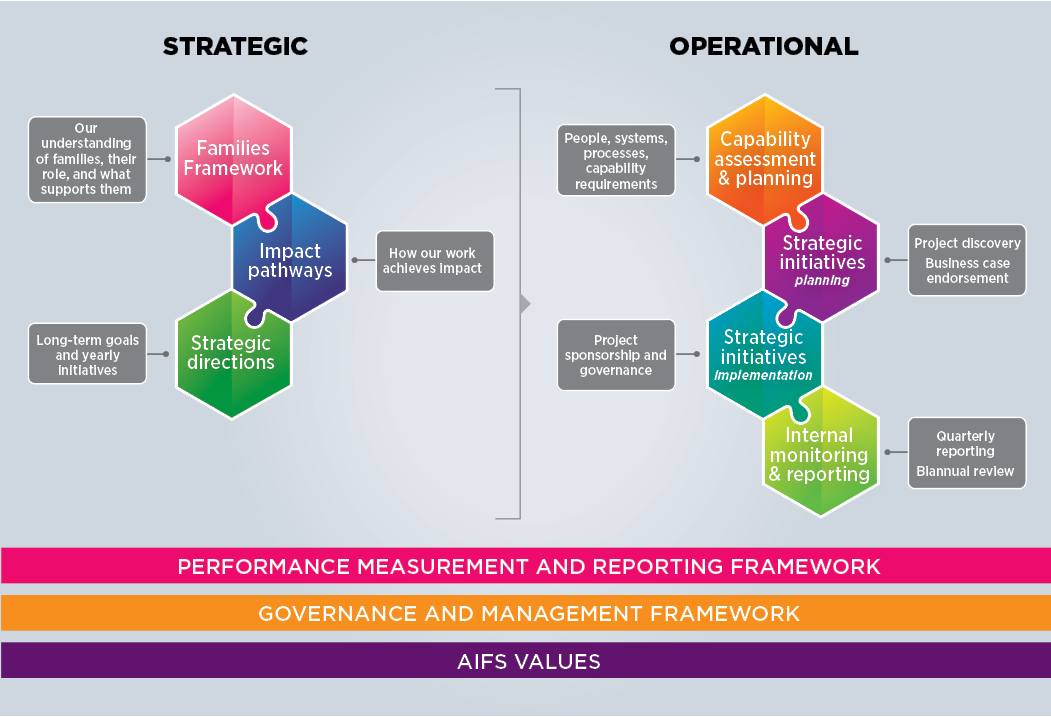
Strategic Directions: 2020/21 and beyond
Outcome statement
In our Portfolio Budget Statement, the single outcome statement for the Institute is: an increased understanding of factors affecting how families function by conducting research and communicating findings to policy makers, service providers and the broader community.
Organisational purpose
Our purpose is to create and communicate knowledge to accelerate positive outcomes for children, families and their communities.
Four pillars
Four pillars organise the work we undertake to achieve this outcome. We:
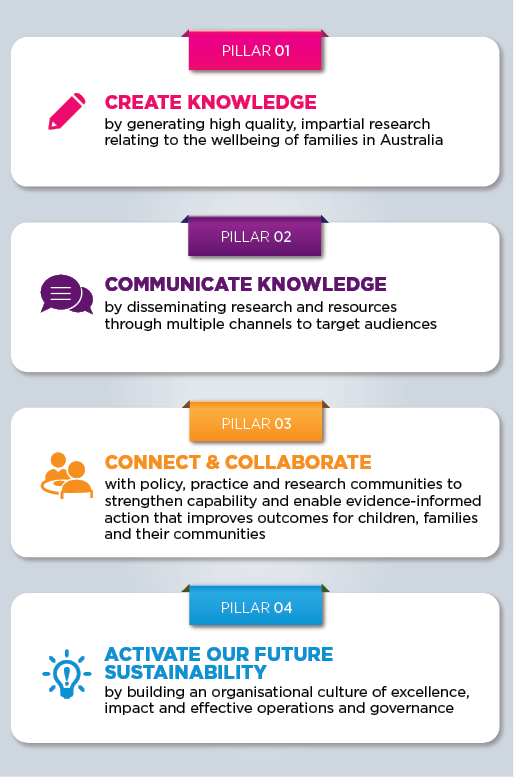
Strategic goals
At the commencement of the current Strategic Directions, we identified four ambitious goals to achieve:

We are recognised as the premier research organisation investigating factors affecting wellbeing of children and families. Government and non-government sectors engage us to undertake research and provide advice that informs policy, practice and program development.

We are the leading source of accessible, timely and relevant resources to support the work of policy and practice and inform the broader community. Our resources inform national discussions about family and wellbeing.

AIFS is a recognised thought leader in accelerating positive outcomes for children, families and communities.

We are operationally efficient and financially sustainable. We maintain a sustainable program of research that enables us to achieve our purpose. We are an organisation of choice for people who want to make a difference.
Each year, we identify shorter-term, mission critical initiatives that help us to achieve these goals. AIFS' Strategic Directions are described in Figure 3.
Figure 3: AIFS' Strategic Directions: pillars and goals
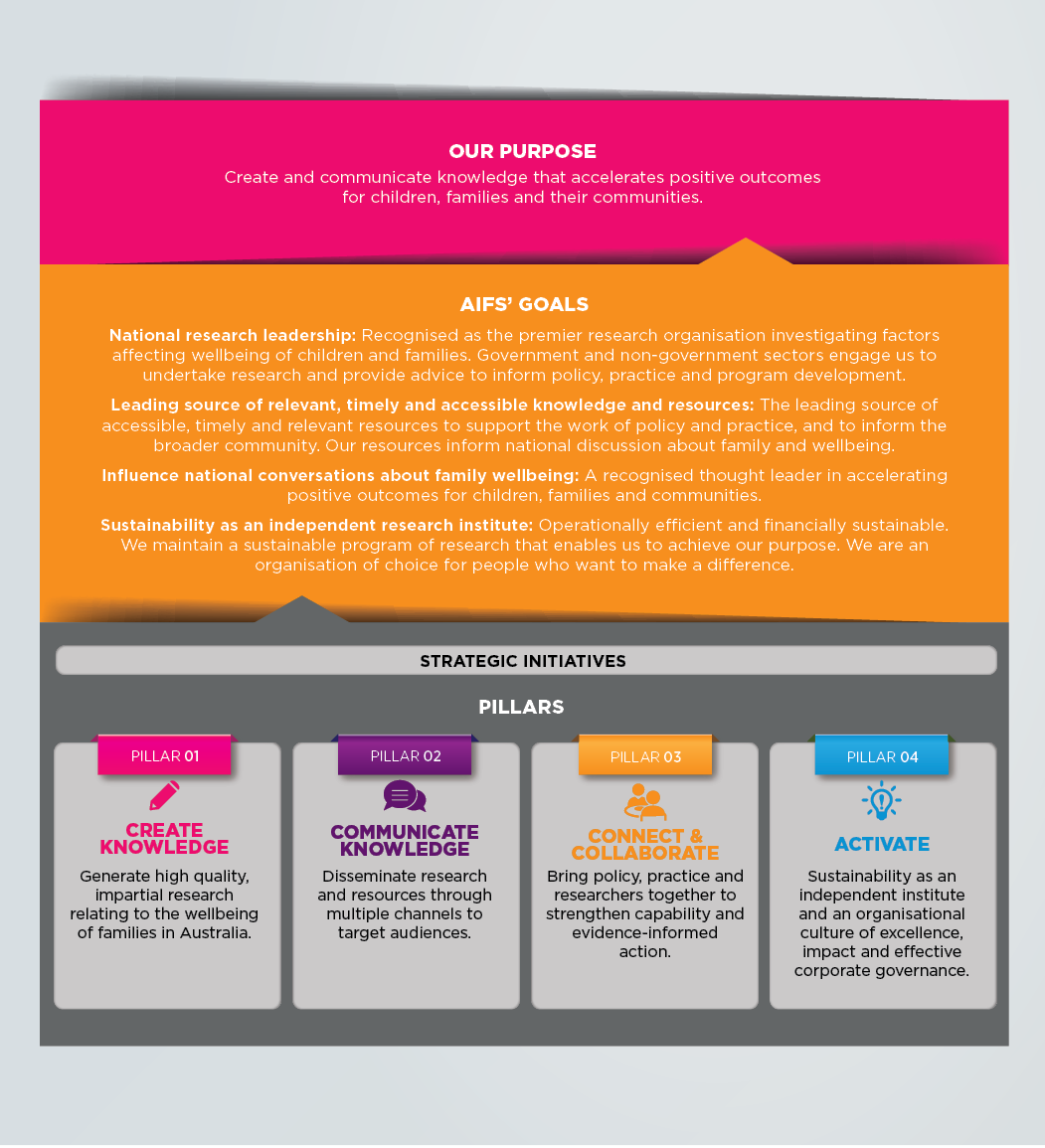
Strategic Initiatives for 2020/21
Identification of the Strategic Initiatives for 2020/21 has taken place against the backdrop of the global COVID-19 pandemic. COVID-19 represents one of the most significant disruptions to Australian society since World War II.
The Institute has rapidly adapted to maintain our operational effectiveness and research impact in this new 'with-COVID world', including identifying which systems and capabilities need to change or need to be bolstered. We have invested, and throughout 2020/21 will continue to invest, considerable organisational effort to:
- establish new ways of working collaboratively with colleagues and partners in a remote working landscape
- continue our delivery of high quality products and projects to funders
- meet the emerging needs of our end users and stakeholders as they too shift practice
- maintain and strengthen our workplace culture in the absence of physically being at work.
Our Strategic Initiatives for 2020/21 are focused on strengthening our capability to meet the needs of a changed - and changing - landscape for governments, services, researchers and, of course, families and their communities.
In 2020/21 we will:
- Develop AIFS Strategic Directions 2021-26: Development of the next five-year plan for 2021-26 is a key priority. The planning process is underway and will result in a comprehensive strategic plan to ensure AIFS continues to be a national voice on the factors affecting families in a rapidly changing world.
- Implement multiple waves of the Families in Australia Survey: For insights and analysis about how families are coping with and adjusting to the COVID-19 pandemic and beyond, the survey will touch on areas of everyday life including family relationships, work, education, finances and caring responsibilities.
- Deliver the AIFS Conference: This was to be delivered in June 2020 and was to mark the 40-year anniversary of the Institute's establishment. However, the risks of the pandemic required rescheduling the conference to 15-18 June 2021. The conference will bring together the collective expertise and commitment of policy, civil society, researchers, services and communities to reflect on the social and economic impacts of COVID on families, and the challenges and opportunities it presents for families in Australia into the future.
- Implement a knowledge translation capability-building program for our stakeholders: We will build on last year's knowledge translation and impact initiatives to deliver a capability-building program that will provide training and support to organisations to increase their ability to integrate research and evidence into their decision-making processes. The program aims to:
- lift the relevance and use of research evidence about what works for families
- build the skills of practitioners and policy makers to better understand how they can incorporate research evidence into their decision making.
- Redesign our website to ensure that AIFS' research and resources are discoverable, relevant and timely for our users, and support practitioners and policy makers who wish to apply evidence to their work with families.
- Implement the Doing My Best Work Performance Development Program to enable all staff to do their best work, develop their potential, and to contribute collectively to AIFS' purpose through a high performance culture.
Figure 4: AIFS' Strategic Initiatives
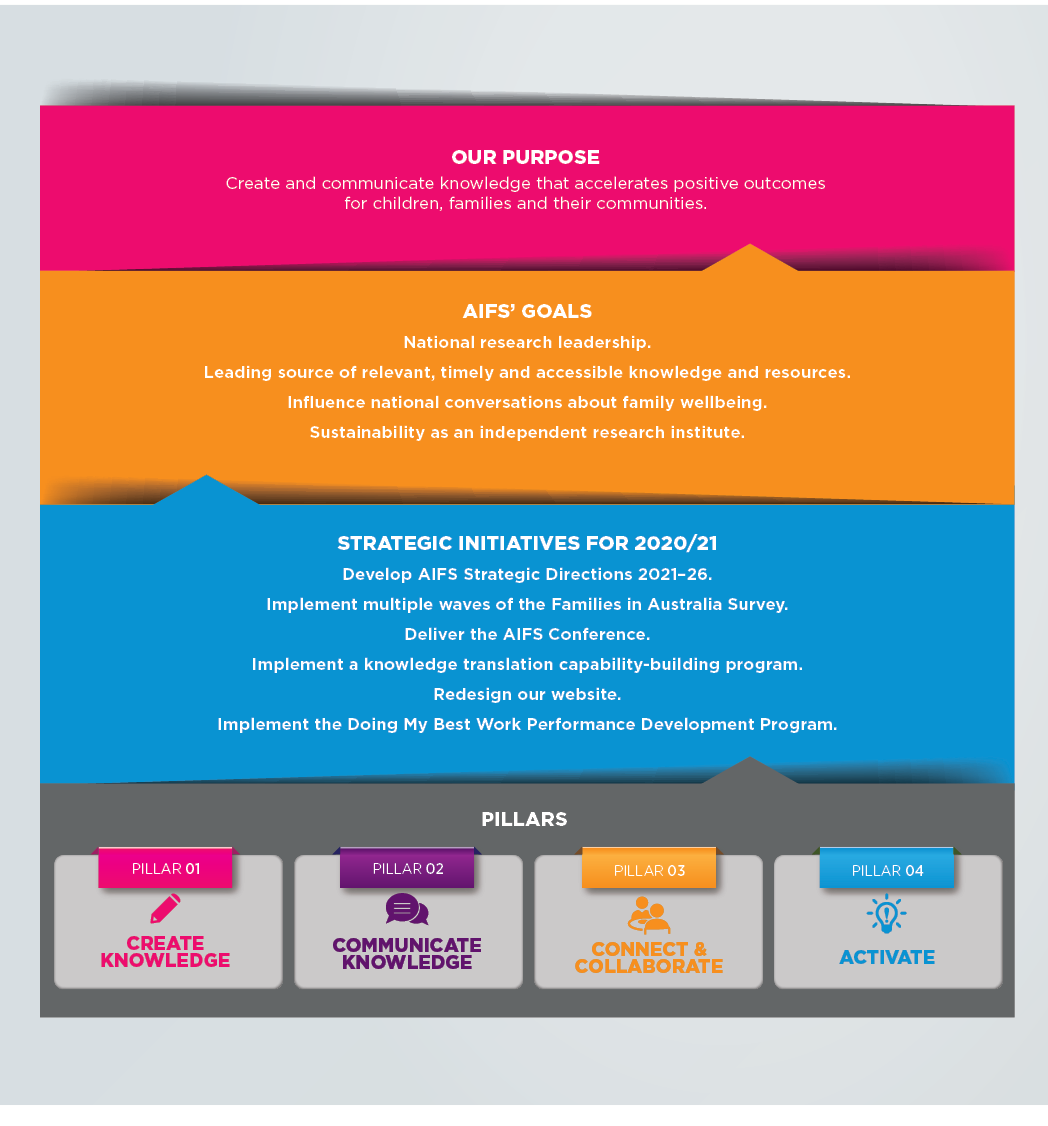
Our pathway to impact
In 2018/19, we developed a high-level theory of change that outlined how, through our current work, we accelerate positive outcomes for families.
Through Pillars 1, 2 and 3 we:
- conduct research to understand the issues facing families
- synthesise findings in formats that are relevant and practical
- communicate insights through one-on-one and one-to-many interactions
- connect policy makers and service providers around specific issues.
The primary beneficiaries of these activities are:
- government and policy professionals who directly commission services or who seek our expertise, support and resources in the course of policy design, implementation and evaluation. For example, state and federal strategic policy and line agencies.
- service providers across the human and community services sectors that work directly with children and families. For example, child and family welfare services; out-of-home care; sexual assault and domestic violence services; education providers; mental health services; alcohol and drug services.
For the government and policy sector, the benefits we provide are:
- deeper insight into the nature of trends, issues and challenges facing families; ideas, solutions and options for addressing these; and the impact of policy and service changes on families
- education and capacity building by:
- challenging current thinking and approaches; reality checking; supporting knowledge use and providing knowledge in response to questions
- enhanced quality of organisations and programs funded by government through AIFS' service capacity building
- assurance: a trusted and independent organisation to undertake complex and sensitive research.
For service providers in the human and community services sectors, the benefits we provide are:
- access to relevant knowledge: increased quality of knowledge; increased access to knowledge; connection with other organisations
- capability building: professional development; practice development; confidence in their approach; ideas for new programs
- strengthened evaluation of practice: improved standing with funders; enhanced capacity to self evaluate.
As a result of AIFS' actions:
- Policy makers use our insights to enact systemic change via policy and resource allocation.
- Service providers use our insights to develop their people, deliver direct action, and enhance their programs and practices for better family outcomes.
- The outcome is more effective legislation, programs and practices.
- The impact is better outcomes for Australian families.
AIFS' Pathway to Impact is represented in Figure 5.
Figure 5: AIFS' Pathway to Impact
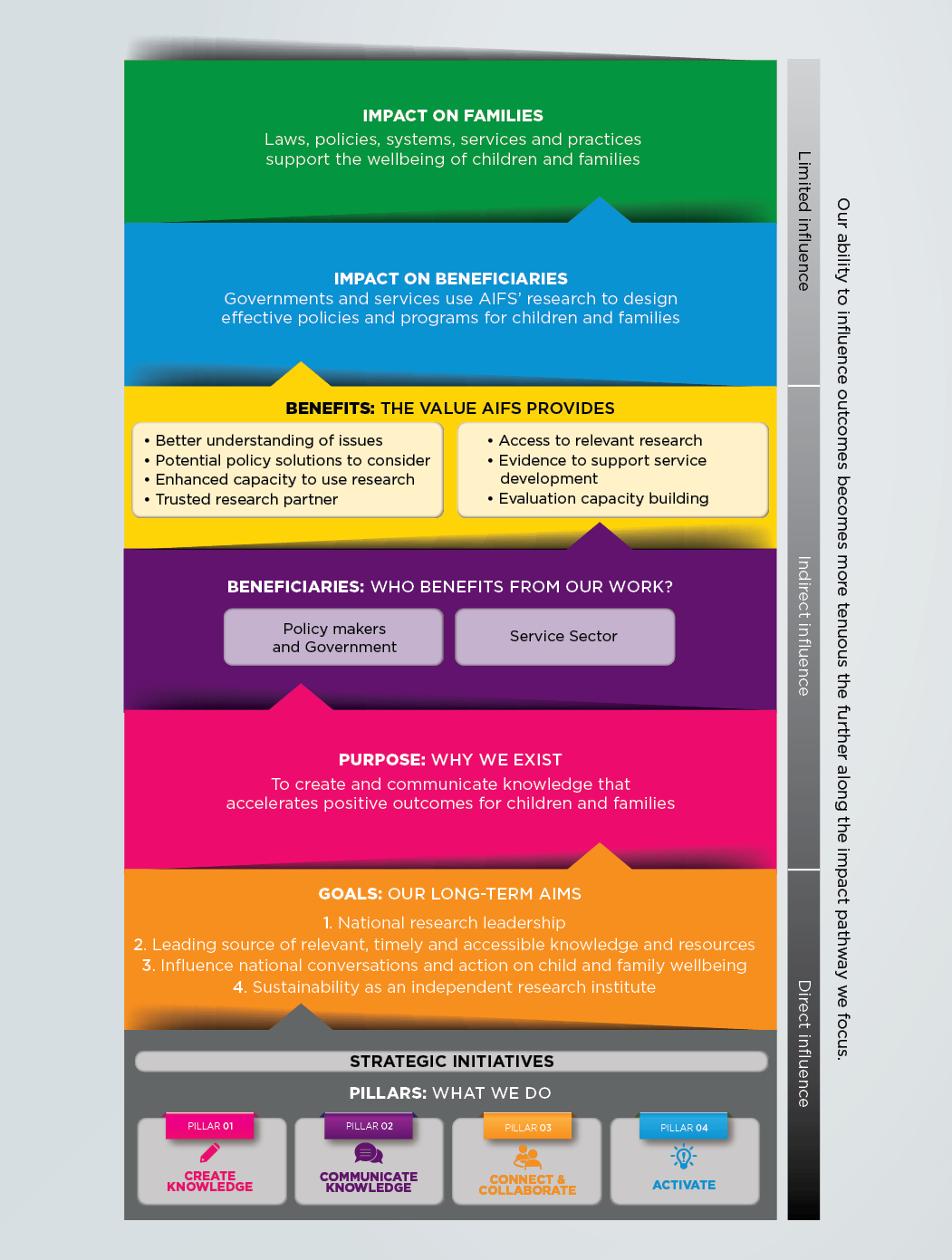
Performance measurement and reporting
Our performance measurement needs to tell a meaningful story about how well we are achieving our planned outcomes and impact. We have reviewed the way we measure and report on the Institute's performance.
Drawing a clear link between research and impact is challenging, particularly in the area of social policy. Improving life outcomes for children and families is a complex social and policy issue involving multiple actors; additionally, translating 'knowing' into 'doing' is a long-term endeavour involving multiple pathways.
As Figure 5 demonstrates, our ability to influence outcomes becomes more tenuous the further along the impact pathway we focus. However, AIFS' Pathway to Impact provides a hypothesis about how we can influence this, by ensuring our research and products:
- support the needs of policy and service communities
- provide answers to their research questions.
Our performance measurement framework aims to better identify and report on outcome and impact measures and to move beyond simple output-based metrics.
Performance measurement framework
As shown in Figure 6, our performance measurement framework uses a program logic model to link inputs, activities, outputs, outcomes and impacts against our Strategic Goals and Impact Pathway:
- Inputs are our resources, staff and assets.
- Activities are what we do on a day-to-day basis.
- Outputs are the products, resources and organisational practices produced as a consequence of these activities.
- Outcomes are the results we wish to see as a consequence of our activities and outputs, namely: our research is sought out by our stakeholders; our research is seen as relevant by our stakeholders; and our organisational capabilities support our research activities.
- Impact refers to the consequences of stakeholders seeking out and valuing our work, namely: better understanding among stakeholders of issues affecting families; improved capacity to use research; and deeper insights about what works in policy and practice to support families.
We use quantitative and qualitative data to monitor and measure performance. Qualitative data are drawn from stakeholder feedback and from case studies.
Performance measures for 2020/21 to 2023/24
Performance measures for 2020/21 to 2023/24 are detailed in Figure 7. In 2019/20, we stopped setting year-on-year targets for outputs. Small increases or decreases in these output numbers are not particularly meaningful; for example, the number of projects may decrease but do not tell a story about the national significance of projects and the impact they have. However, outputs are monitored. We report on the previous year and the current year, and where necessary provide a narrative to explain any significant differences.
We have identified targets for outcome and impact measures meaningful to our theory of change. Increases in subscribers, webinar attendees or downloads tell us something about AIFS' reach; increases in stakeholder access to, and use of, our research helps the development of policies and practices that support families. However, year-on-year targets should be informed by previous trend data and represent feasible stretch targets. In 2020/21 we are baselining and establishing appropriate target increments for 2021/22 and beyond.
Finally, while quantitative measures are helpful to performance monitoring and evaluation; on their own, they are not sufficient to demonstrate research impact. The Annual Reports include case studies to report on outcomes and impact.
Figure 6: Performance measurement framework
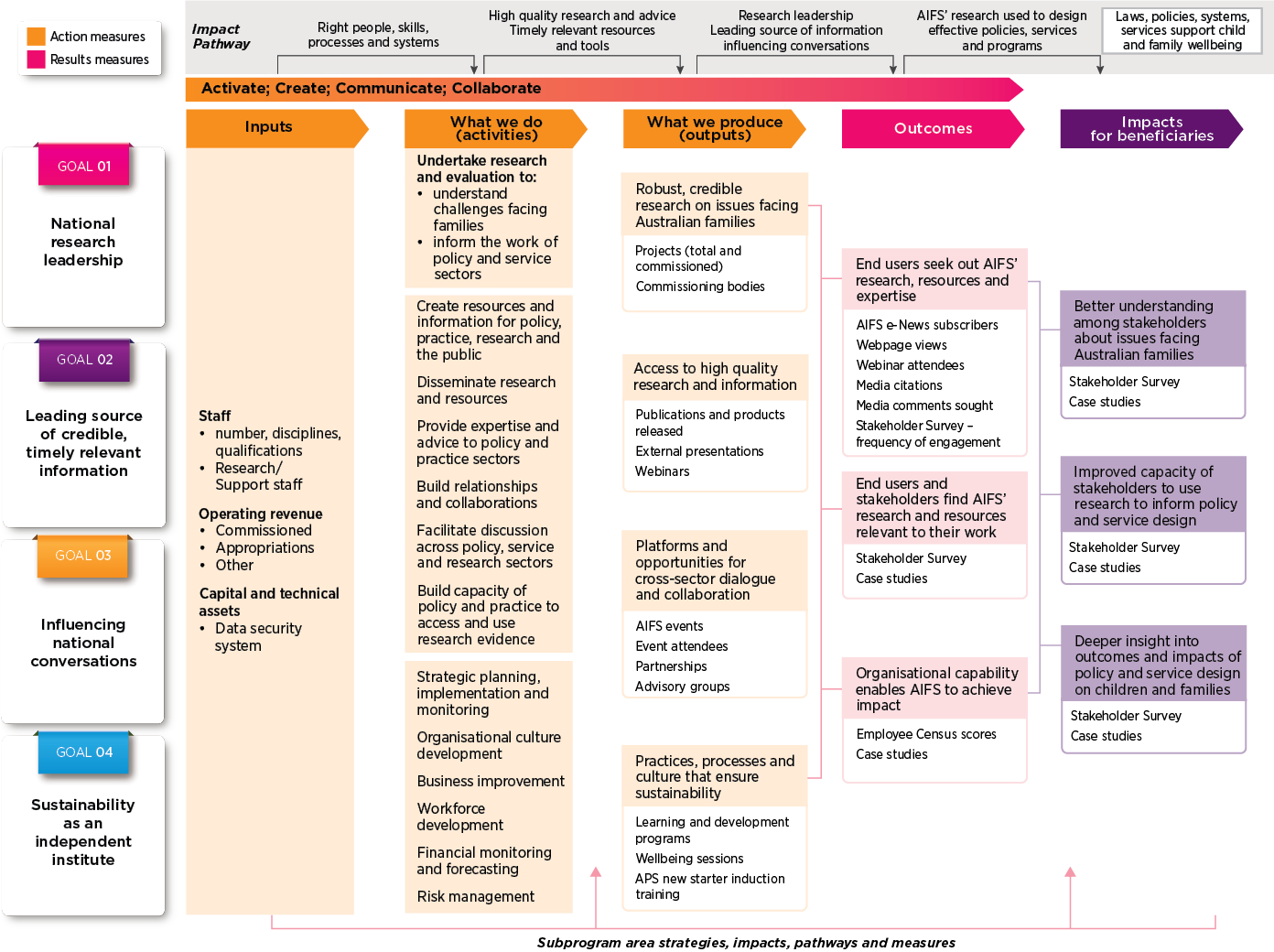
Figure 7: Performance measures 2019/20-2022/23
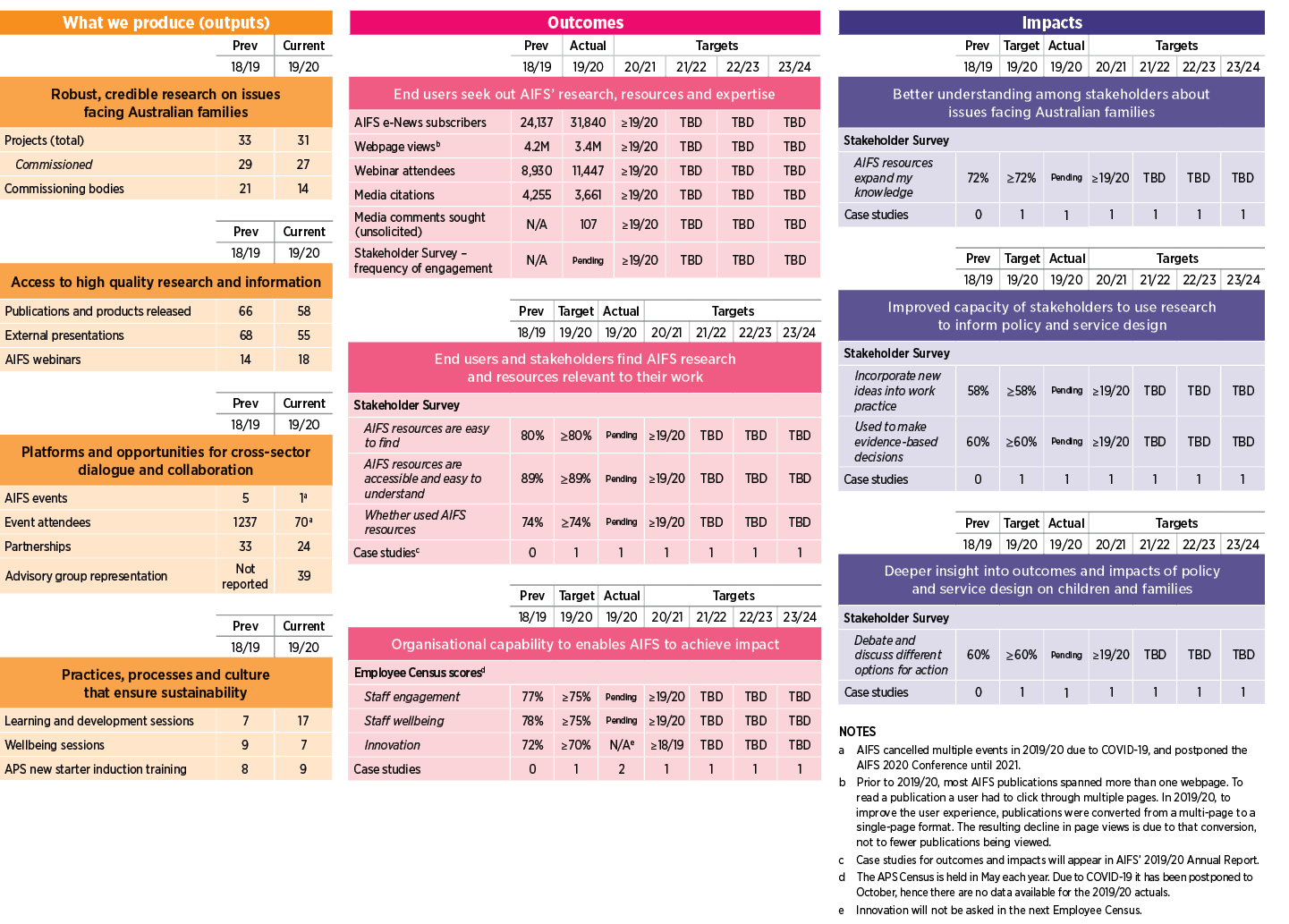
Our capability
Research excellence
We have research capability in a broad and diverse range of issues affecting Australian families. Our multi-disciplinary teams span social science disciplines such as sociology, psychology, economics, demography, law and public health, as well as data sciences. We have experts in:
- primary research involving a range of data collection and analytic methods (quantitative, qualitative and mixed methods)
- large-scale surveys and longitudinal studies
- data linkage and integration
- data analysis and interpretation
- systematic reviews, rapid evidence assessments and literature reviews
- policy and program evaluations, including co-design and developmental evaluation
- translating knowledge and evidence for practitioners, policy makers and the general public
- building evaluation skills and capacity to improve effectiveness in the family services sector.
A key strength is our wide range of expertise across disciplines, and our ability to conduct both quantitative and qualitative research to create useful evidence to inform policy on complex social problems. Research staff biographies can be found on the AIFS website.
Our research excellence is underpinned by the following capabilities:
Capacity to work with administering departments and other stakeholders
We have a very strong track record of working in close cooperation with a range of administering departments, partner organisations, scientific advisory groups, fieldwork providers and study participants. We are renowned for our collaborative approach, capacity to maintain open and responsive communication, and delivery of solutions that meet the needs of diverse stakeholders.
Willingness to support customised methodologies
We have a breadth of experience with innovative studies that require complex solutions, including data collections with unique populations (such as humanitarian migrants), as well as diverse data collection approaches such as online surveys, computer-assisted interviews, tablet-based surveys and paper-based surveys.
High-level sampling expertise
We have in-depth expertise in the selection of participants for new studies, or the refreshment or augmentation of samples, including the development and successful implementation of sound and complex sampling designs.
State-of-the-art instrument development
We have a highly dedicated team with world-class expertise in the development of instruments and questionnaires for use in national surveys and with diverse populations.
Demonstrated excellence in psychometric and data-analytic work
We have data analysts from many backgrounds, including health science, psychology, statistics, social science and econometrics; we also have experts in the analysis of large-scale and longitudinal datasets, and linked or complex administrative datasets.
High-level expertise and experience in data linkage
We are one of six accredited Data Linkage Integrating Authorities in Australia. This means we are authorised to undertake data integration projects involving sensitive Commonwealth data for statistical and research purposes. Data linkage has been a key element of many of our longitudinal studies and, as a result, we have exceptional skills in this area.
Knowledge translation and dissemination
We have exceptional expertise in writing for a broad range of audiences including policy makers, researchers, practitioners, study participants and the general community. We have extensive experience in producing a variety of products ranging from complex reports and peer-reviewed articles to fact sheets, infographics, videos and other materials designed for a lay audience.
People and culture
We are relying on our strong culture of innovation, engagement and wellbeing to adapt to the COVID-19 pandemic.
In 2020/21 we are continuing to focus on the following priorities to increase the engagement of our people. In doing so, we will continue to position ourselves as an employer of choice for researchers and knowledge translation professionals.
High performance culture
A high priority is implementing the Doing My Best Work Performance Development Program to enable all staff to do their best work, identify development and career opportunities, and to contribute collectively to AIFS' purpose through a high performance culture.
Workforce planning
We are working to ensure we have staff with the right capabilities to meet our goals, and that they have clear pathways to progress and develop their talents. We are building our capability to ensure we recruit for our culture and values, and to ensure we identify workforce needs and meet them effectively.
Learning and development
In 2020/21, the ongoing development of capability will have a strong focus on the skills required for effective performance planning, coaching and sharing feedback. More online and remote delivery methods will be used to meet the needs of the workforce in a post-pandemic environment.
Values and culture
We will continue to undertake activities that embed the values and behaviours that staff have identified as critical to achieving our goals and desired culture. We will continue to run the regular staff surveys we implemented during the pandemic to identify priority actions for our workplace culture.
Staff wellbeing
Staff wellbeing initiatives continue to be a strong focus of our work in 2020/21, with an emphasis on physical safety in home-based work environments and mental health given the current challenges we are adapting to. In 2020/21 we will focus on implementing NewAccess Workplaces (led by Comcare and delivered by BeyondBlue), an innovative preventative and early intervention mental health coaching service, as an additional support to staff.
Diversity
We are focusing on refreshing our policies and action plans for workplace diversity. These include: our Reconciliation Action Plan and plans to increase Indigenous representation; representation of people with disabilities; gender equality; and culturally and linguistically diverse representation in our workforce. In this coming year we have a particular focus on improving the capability of our managers to recruit and lead people with disabilities in our workforce.
We expect to maintain an average staffing level of around 82 full-time equivalent employees.7 We offer flexible working conditions to attract high quality professional staff who wish to balance their work and caring responsibilities or other commitments. This is consistently identified by staff as one of our organisational strengths. Over 45% of staff work on a part-time basis and over 76% of our staff are women. Just over 60% of staff hold post-graduate degrees, which reflects the fact that our work is complex and specialised, requiring highly developed skills and qualifications.
It is pleasing to note that our Employee Census indicates the positive impact of our people and culture initiatives over time.
The number of staff reporting that they recommend AIFS as a good place to work:
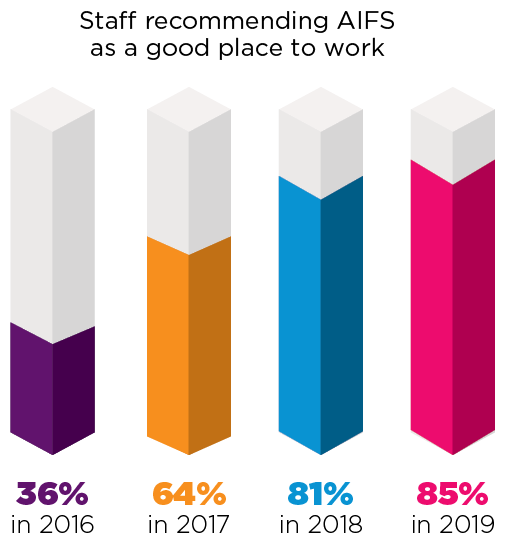
Information management and technology
The following key principles guide our approach to information management and technology at AIFS.
- Be agile: Deliver solutions using a customer-centric agile approach that encourages people and projects to adapt as needs change to deliver fit-for-purpose solutions.
- Be financially responsible: Maximise the value of IMT by reviewing opportunities to reduce cost without loss of service and providing solutions that are value for money.
- Be digitally integrated: Enable a vibrant and digitally integrated environment that supports and enhances the user experience.
- Reduce complexity: Opt for simple and secure access to systems and information that enable agility and innovation.
The information management and technology initiatives we will focus on in 2020/21 include:
- the roll out of Microsoft 365, for improved collaboration and reduction of system complexity. Microsoft 365 will provide a records management solution, improve the ability of staff to share and collaborate on files and provide a centralised platform to meet our chat and video conferencing requirements.
- a review of AIFS digital presence. This project will include redesigning the AIFS website, reviewing the information architecture and user experience, and assessing and implementing a solution for content management.
- a technology infrastructure review. The project will help to determine the benefits and considerations of moving present on-site IMT infrastructure to cloud-based services.
Data linkage and integration
We are an Accredited Integrating Authority. Our key services include data scoping, data linkage and integration, secure hosting, analysis and research of linked data, and advice and collaboration. In 2020/21, our goal is to facilitate key linkage and integration services to research projects with other organisations including universities and other research institutes. We are also regularly involved in APS-wide initiatives to advise on legislative changes related to data sharing (e.g. Data Availability and Transparency Act). In 2020/21 our goal is to obtain accreditation to become both an Accredited User of Data and an Accredited Data Service Provider, guided by the new Office of the National Data Commissioner.
Data management and governance
We provide data management services to the highest standard by meeting Commonwealth criteria (secure management, information governance and storage of data) that underpin all aspects of the data life cycle. We have prioritised a review and an enhancement of our data management strategy in 2020/21. The strategy will address three broad areas:
- data management policies in the new environment
- metadata management of data holdings
- discoverability and findability of data and its contents and the management of the research data life cycle, which includes best practice administrative processes.
We will also be focusing on augmenting our infrastructure for the long-term storage and protection of all our data holdings. Appropriate consideration will be given to cyber security when accessing data.
7 This number may change as due to the revised budget timelines, we were still finalising our Portfolio Budget Statement at the time of writing.
Risk oversight and management
We are committed to promoting a proactive, positive risk culture based on accountability, transparency and fairness. The Director and the Executive Team oversee our risk management, information and privacy management, and control and compliance requirements. They are supported by the Risk Assessment and Audit Committee (RAAC), which ensures effective and efficient use of public resources by providing an external review of the performance and operation of our internal controls and performance management systems.
The RAAC reports directly to the Director and is chaired by an external member. It meets four times a year, addressing a range of issues including internal budgets, Portfolio Budget Statements, compliance with the Protective Security Policy Framework, internal and external audit processes, fraud control, risk register and risk profile, PGPA Act compliance reviews, oversight of our privacy management plan, and updates of our Accountable Authority Instructions.
We also receive strategic advice on our research through the Ethics Committee and a range of expert advisory groups.
Internally, the Senior Leadership Group reviews our risk register and privacy management plan every two months. Risk management is an integral part of our project governance. Project managers undertake risk assessments for all projects and are required to report regularly on risk and mitigations. They also develop privacy impact assessments on all projects with high privacy risks.
Risk management is an ongoing and iterative process and each risk in our risk register is reviewed at least annually, with higher rated risks reviewed every two months. Our Risk Management Framework will be renewed during the 2020/21 financial year, as well as improvements to our risk assessments and reviews, and consideration is being given to the adoption of an online centralised risk management system.
© GettyImages/TommL